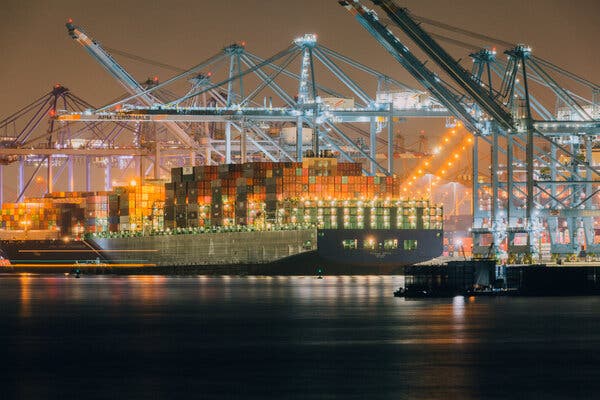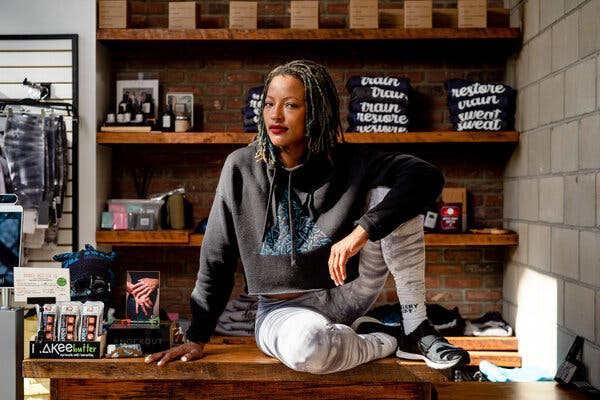The American Rescue Plan that was passed by the Senate and is now back before the House of Representatives would put pump $1.9 trillion into the economy.
The New York Times’s personal finance experts, Ron Lieber and Tara Siegel Bernard, combed through the bill to explain what it means in real terms to real people. Here are some of the questions they answer:
As Georgia Republicans push through measures that critics say will restrict Black citizens’ voting rights, opponents of the effort are calling on big companies based in the state to step up their defense of civil liberties. One of those bills has already passed the House, while another could go to a vote in the State Senate as soon as this week.
Here’s what corporate giants told DealBook about the proposed voting restrictions:
-
Coke described voting as “a foundational right” and said it supported efforts by the Metro Atlanta Chamber and the Georgia Chamber of Commerce to “help facilitate a balanced approach to the elections bills.”
-
Home Depot said that “elections should be accessible, fair and secure and support broad voter participation.” It referred to an internal get-out-the-vote initiative and a donation of 9,200 plexiglass dividers across the state to bolster poll station safety.
-
UPS said it “believes in the importance of the democratic process and supports facilitating the ability of all eligible voters to exercise their civic duty.” It added that it was working with the Atlanta and Georgia chambers of commerce “to ensure equitable access to the polls and the integrity of the election process across the state.”
-
Delta Air Lines called voting “a vital part” of the company’s values. “Ensuring an election system that promotes broad voter participation, equal access to the polls, and fair, secure elections processes are critical to voter confidence and creates an environment that ensures everyone’s vote is counted.”
-
Inspire Brands, the owner of Dunkin’ Donuts and Arby’s and one of the biggest restaurant companies in the United States, did not have a comment.
These statements aren’t enough, activists say. “Just simply saying we support elections — free, fair and accessible elections — without actually addressing the issues currently underway has no teeth,” the Rev. James Woodall, the president of the Georgia N.A.A.C.P., told DealBook.
Companies have played a role in Georgia civil rights battles before. In 2015, businesses like Coca-Cola, Delta, Home Depot and UPS opposed “religious liberty” legislation meant to give companies legal cover to avoid hiring L.G.B.T.Q. workers, citing not only company values but also potential harm to Georgia’s business reputation. Many big companies also publicly pledged to work toward racial equity after the killing of George Floyd and others this past summer.
Mr. Woodall said that it was harder now for Georgia-based companies to both promote moderate social policies and cater to local politicians pushing the voting restrictions bills. “Georgia celebrates being the best state to do business,” he said “But that will change if people feel that businesses don’t support them or their lives are literally at stake.”

Since they were first deployed in 1956, the boxy shipping containers that get stacked on top of one another aboard giant vessels have revolutionized global trade. They allow goods to be packed into standard receptacles and hoisted off the boats by cranes onto rail cars and trucks.
Containers are how flat-panel displays made in South Korea are moved to plants in China that assemble smartphones and laptops, and how those finished devices are shipped across the Pacific to the United States.
Over the past year, the pandemic has disrupted every part of those journeys and disrupted international trade to an extraordinary degree, driving up the cost of shipping goods and adding a fresh challenge to the global economic recovery. The coronavirus has thrown off the choreography of moving cargo from one continent to another.
No one knows how long the upheaval will last, though some experts assume containers will remain scarce through the end of the year, as the factories that make them — nearly all of them in China — scramble to catch up with demand.
“I’ve never seen anything like this,” said Lars Mikael Jensen, head of Global Ocean Network at A.P. Moller-Maersk, the world’s largest shipping company. “All the links in the supply chain are stretched. The ships, the trucks, the warehouses.”

E-commerce saved many retail companies over the past year, as online shopping provided a lifeline after stores were shut, city centers went vacant and customers stayed home.
But for small businesses, the benefit was wildly uneven, Andrew Lipsman, principal analyst with eMarketer, tells Amy Haimerl of The New York Times. There were winner sectors, such as grocery, health and fitness, and direct-to-consumer brands, but apparel boutiques and other specialty retailers — especially those without existing e-commerce platforms — struggled.
The experience of Amina Daniels, the owner of Live Cycle Delight fitness studio in Detroit, underscores the logistical challenges small businesses faced building and competing online.
To produce on-demand video classes, she built a mini production studio inside her spin room, investing thousands in microphones, lights and a film crew. Still, it’s hard to go up against Peloton, which has entire teams producing its digital classes.
About 30 customers left Live Cycle Delight for Peloton, Ms. Daniels said, but she found support in other ways. With the movement to support Black-owned businesses, people donated to her, and there was healthy demand for the studio’s branded merchandise, such as Pilates balls, T-shirts and booty bands, the stretchy bands that add resistance to a workout.
Between the products, outdoor classes in the summer and memberships, she has been able to keep the three-year-old business open. The shift to e-commerce hasn’t been perfect, she said, but it’s been worth it. She reminds herself why she started the studio: to make fitness more accessible and inclusive.
“Peloton is just one kind of experience,” she said. “We’re still here providing clients with an option to join us on the quest of better.”





